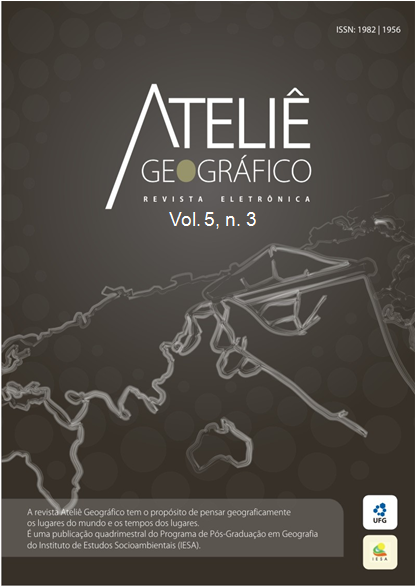A GEOHISTORICAL AND ETHNOGEOGRAPHICAL APPROACH ON BAROQUE PERIOD IN MINAS GERAIS APPLIED TO LANDSCAPE RESEARCH IN FORMER MINING REGIONS OF BRAZIL
DOI:
https://doi.org/10.5216/ag.v5i3.16627Abstract
This paper discusses an experience that has investigated the relations and interfaces between different fields of knowledge, enabling reworks about the ideas around the Baroque period (and privileging ethnogeographical paradigms of interpretation). The methodology included: bibliographic research; problematization and group discussion on the conceptual categories involved; field works and data systematization. The paper gives a reading of iconographic elements of this historic period and is directed to graduate/post graduate students in interaction with elementary school teachers, allowing so a dialogue with the School Geography. In the research, it was privileged the reading of African descents’ influence in the consolidation of a unique cultural substrate (from postulations that assume that the incorporation of the African component in the understanding of Brazilian culture remains a strategically question to understand in national scale and that still requires more careful analysis). The Baroque mixed profane and sacred characteristics and still reverberates in the current reality nowadays. The investigation placed in the evidence particularly the cross-cultural mixes which represented then codes for amalgam a new cultural universe, full of dynamism.
Downloads
Downloads
Published
How to Cite
Issue
Section
License
Autores que publicam nesta revista concordam com os seguintes termos:- Autores mantém os direitos autorais e concedem à revista o direito de primeira publicação, com o trabalho simultaneamente licenciado sob a Licença Creative Commons Attribution que permite o compartilhamento do trabalho com reconhecimento da autoria e publicação inicial nesta revista.
- Os autores não serão remunerados pela publicação de trabalhos na Revista Ateliê Geográfico. Além disso, os conteúdos publicados são de inteira e exclusiva responsabilidade de seus autores, ainda que reservado aos editores o direito de proceder a ajustes textuais e de adequação às normas da publicação.
- Autores têm permissão e são estimulados a divulgar seu trabalho online (ex.: em repositórios institucionais ou na sua página pessoal), já que isso pode gerar alterações produtivas, bem como aumentar o impacto e a citação do trabalho publicado (Veja O Efeito do Acesso Livre).


